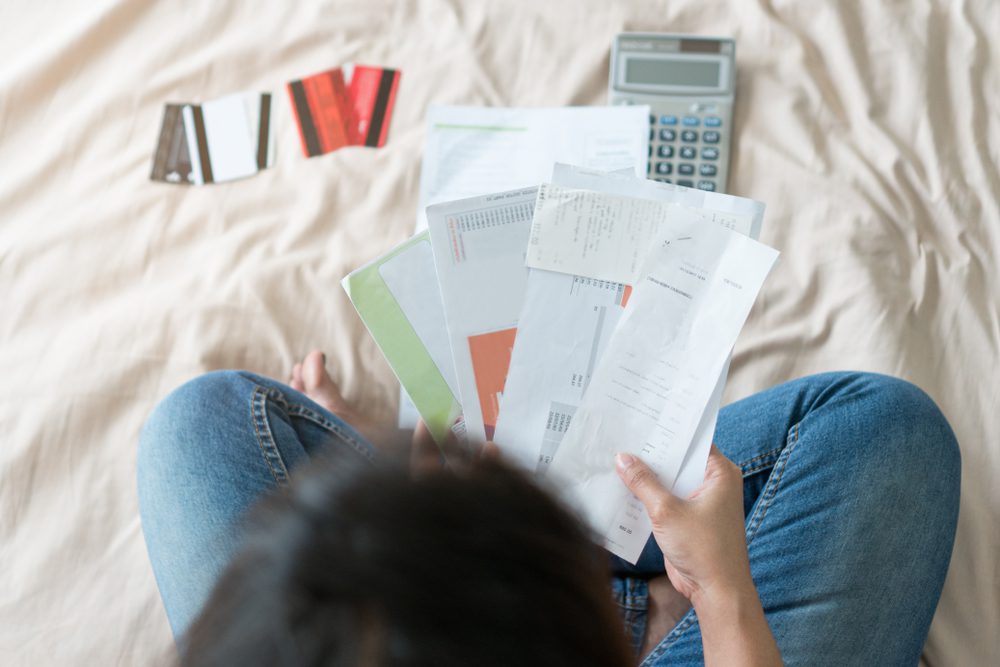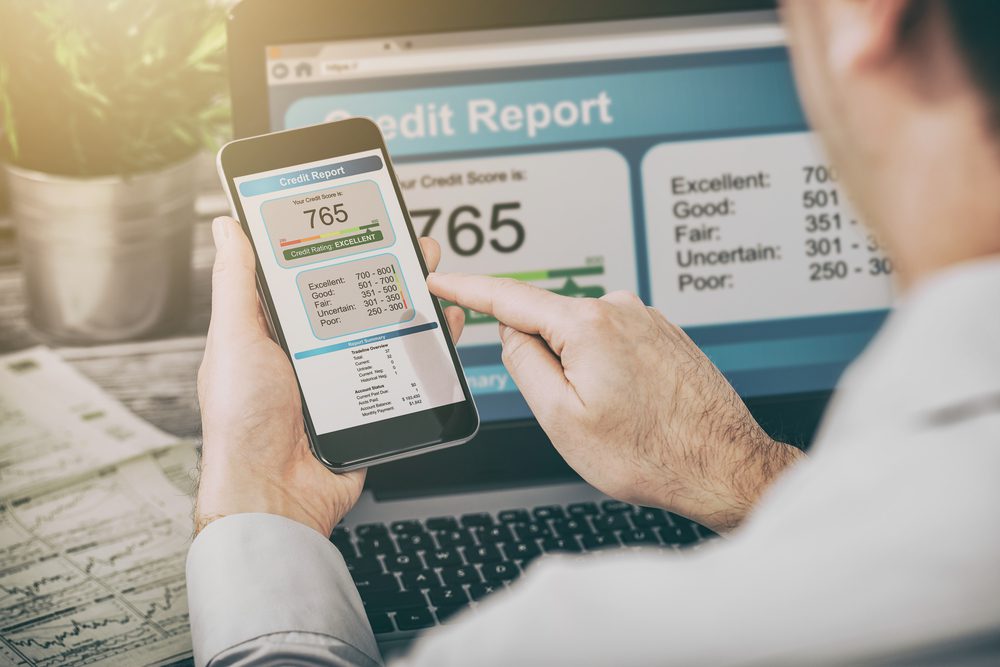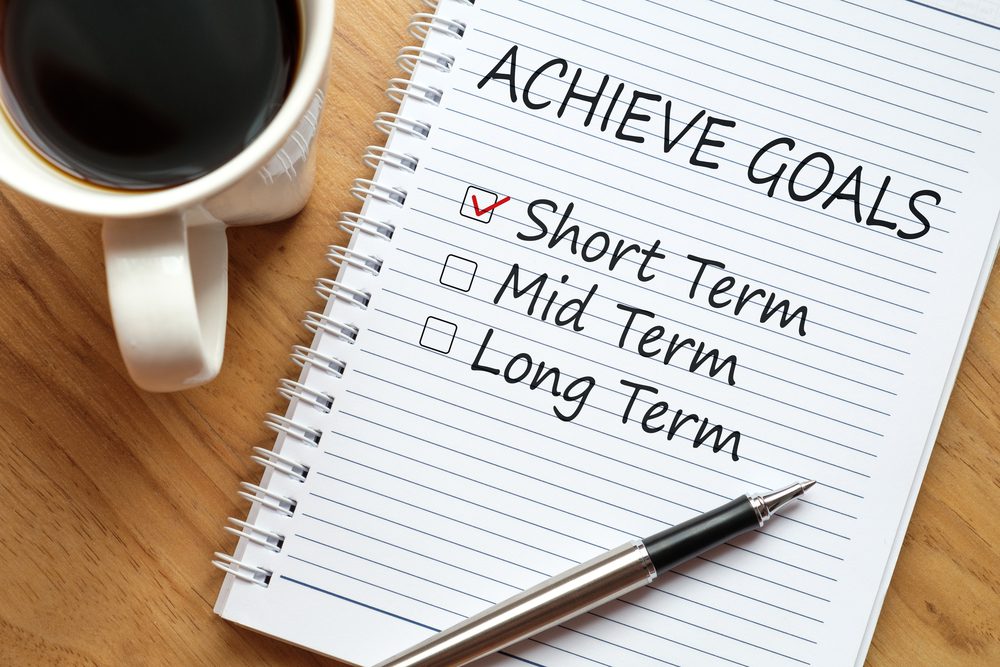
Racking up debt is something thousands of people across the U.S. deal with every single day. From small decisions to big mistakes, there are plenty of things that can nudge us down this dangerous path. Don’t believe us? Just look at the numbers.
According to the Federal Reserve Bank of New York, the total household debt in America had reached $13,95 trillion! Furthermore, a frightening 80% of Americans of all ages are currently in debt. Except, perhaps, for your 5 year old niece or nephew!
So ‘am I going to be in debt all my life?’ is a pretty valid question, albeit a grim one. We’ve looked at 16 signs that you’ll be in debt forever but we’re also here to give you good, solid advice. If you recognize any of these then it’s time to put our suggestions to the test so that one day soon you’ll be debt free.
You Believe Debt Is Part of Life
If you think that debt is a ‘necessary’ part of life then your chances of getting out of debt plummet considerably. That’s because you’ll be lacking the motivation to get out of debt by not addressing it as an issue that needs fixing.
Thanks to a 2015 Pew study we also know that 7 out of 10 people think this way. So, if you’re one of those 7 then you might think that you wouldn’t be able to get out of debt even if you tried. But that’s far from the truth.
Most financial advisors agree that what you need is a wake-up call. Now, this might sound harsh or impossible, but tracking down what you spend money on and how is the first step! If you rely on debt to maintain your lifestyle, it’s no wonder you’re used to thinking about it as just another facet of your life.
Finally, coming up with a plan that will tackle your debt will make it easier to put into action. If you’re at this stage you can’t rely on wishful thinking, you won’t get very far.
You Use Credit To Cover Emergencies
Using credit to cover for emergencies is a knee jerk reaction many Americans will face in their lifetime. Those who are not financially prepared for rainy days have no choice but to rely on credit. So though going into debt seems like a favorable outcome to not dealing with whatever emergency you’re facing.
And let’s get one thing out of the way- emergencies can get expensive. Take medical issues or damage to your property, for example, all things you couldn’t possibly ignore.
Naturally, we’re not saying you should ignore them either. In fact, the solution to this problem is the complete opposite. Creating an emergency fund, as difficult and dreadful as that sounds, is the one solution that will see you through difficult times.
You should be able to cover six months of expenses with your emergency fund. You never know how secure your job is, as proven by the Coronavirus outbreak, which left millions of people unemployed across the U.S.
On top of saving up, you should also make sure your insurance covers catastrophic events including car accidents or medical emergencies. With all your bases covered, if disaster strikes, you won’t ever have to rely on credit for help.
You Make Only Minimum Payments
Making minimum payments will get you nowhere, fast.
Not only will you extend the period you’ll be in debt for, but you’ll be paying way more in interest. The faster you get rid of your debt, the more money you can keep for yourself. It’s often said that you should start with a monthly payment of 5% of your balance.
Why? Let’s look at an example of a 3% payment in a $5,000 balance. Assuming the card has a 17% rate, it would take you 14 years to pay it off. What’s more, you’ll also be paying $4,000 in interest.
However, with a slightly bigger payment, you’ll not only cut your interest in half but also your payoff time. If you make getting rid of debt a priority, you’ll get rid of it that much faster.
You Allow Expenses To Rise With Income
Most people find that their debt balloons as their income grows. While we’d all like to believe that once we receive a bigger paycheck we’ll finally tackle our debts, the truth is that so very few of us do!
That’s due to how we handle expenses. Financial discipline is something a lot of people lack, sadly. Due to this, you might be more likely to buy bigger and more expensive things (like a house or a car), relying on credit instead of tackling your debt first even if you’re carrying it from a time when you were earning less.
Though you might feel inclined to treat yourself with a new purchase as soon as you get your raise or bonus, reeling yourself back will be more beneficial, we guarantee it. Don’t allow your debt to grow by settling on big-ticket items again and again.
You Use Payday Loans
If you’re in a real pinch and need to use a payday loan, and if you have a good plan on paying the money back in 14 days, then you’re probably going to be fine. Most short-term payday loans have to be paid back within two weeks, but there are rollover features that allow vulnerable people to fall into debt.
Sadly, this is what most payday loan users do in order to cover expenses, according to Pew. But by extending the amount of time they have to pay off the debt they’re falling into a vicious trap.
The real culprit here is the high-interest rate. On average, these can reach 391% for these kinds of loans. Because of this, if you roll a $325 payday loan eight times, you’ll end up having to pay back $793. Do that a couple of times and it’s no wonder that getting out of debt might seem impossible.
As we said earlier if you truly need to resort to a payday loan, make sure you don’t rollover your payments, not even once. Even if you have to get a second job or sell some stuff out of your house!
Next, you should start focusing on improving your credit score in order to qualify for more conventional loans in the future. Need help in that particular department? Here are the 8 Easiest Ways to Improve Your Credit Score!
You Don’t Track Your Finances
No, keeping track of your finances does not mean taking a peek at your account at the end of the month to ensure you’ll make it to the next paycheck. Keeping track of your finances means really looking at your spending habits and developing techniques to cut back, especially if you’ve got debts that need paying!
You can easily stay on top of your money and expenses by using your bank’s apps or checking their websites, but there are plenty of third-party apps that offer the same services with added bonuses.
Take Mint, a great app that links all your financial accounts in one place. If you check it regularly you might cringe at some of your expenses if they get out of hand. That’s the first step of cutting back. Next, since you’ll find yourself with more money at the end of the month than usual, paying your debt should become easier.

You Disregard Your Credit Score
If you ignore your credit score and allow it to get really unhealthy, you’ll end up with a very high interest rate. The higher the interest rate, the more difficult it will become for you to pay off your debt.
Check out this article to learn how to improve your credit score.
But we’ll give you a few pointers here. The easiest step is making sure all your bills get paid on time. By keeping your credit utilization rate below 30%, you’ll also improve your score, so it’s a good idea to start budgeting and start looking for cheaper alternatives for the things you love.
Finally, use a credit-building loan. An accessible solution would be the Self app in which you will make payments to yourself over one or two years. The app then shows this data to all three credit bureaus and, once you’re finished, you will receive your money back on a monthly basis, minus fees.
It’s a great way of investing in your future and fixing your credit score!
You’re Not Maximizing Your Earning Potential
A lot of times people rely on saving and budgeting in order to get out of debt, but the truth is that those techniques can only get you so far. If you’ve been doing it for a while, using every coupon site, unplugging all your electronics when you didn’t need them and more yet still you’re struggling, then it’s time to refocus.
It’s time to maximize your earning potential.
You might not be able to ask for a raise or wait for a bonus, but you can look for work outside of your main job. If part-time work doesn’t mesh with your schedule then you should start looking into the gig economy, where you typically don’t need any special training.
Pet sitting, gardening, delivery, these are all viable options. If you time them just right you might find a combination of side gigs that you can tackle at the same time! If you have artistic skills consider selling your work for commission, the possibilities are endless.
You Are Overwhelmed by Student Loans
Student loans have long since known to be tremendously difficult to handle for both children and their parents. Today, student loan debt has reached $1.5 trillion, while 9% of payments are at least 90 days late.
Thankfully, there are steps you can take to help with this issue, chief among which is speaking to a student loan counselor who will help identify your or your child’s problem. They can help you come up with a solution that might include loan consolidation or income-based repayments.
Of course, if you or your child are still in school then you might get ahead of the issue by looking for grants and scholarships.
A good piece of advice for those who have not enrolled yet but are worried about racking up student debt in the future would be to look at earning potential versus costs. If you can find a comfortable middle ground then tackling payments later on in life won’t be too difficult.
You Allow FOMO To Dictate Your Spending
The fear of missing out is more prominent than a lot of people think. Some allow it to dictate most, if not all, of their spending habits. More dinners, more clothes, more beauty and personal care items might be added to your cart than you need and it’s not difficult to see why.
If you’re used to scrolling through social media then you’ve probably seen a lot of promotions from several influencers. Seeing them and your friends have fun with all their new goodies might make you want to match that level of fulfillment.
A good way to ensure you don’t overspend is to spend cash instead of credit. That way, whenever you open your purse or wallet you’ll see concrete evidence of how much money you have left, which should make you think twice.
Just remember, it’s alright not to go out for drinks or eat out every day, and you don’t need the latest product to make you happy. The people who are pressuring you to buy, buy, buy? They’re probably in the same boat as you are, so think twice before making any purchases.
You Have Your Financial Priorities Mixed Up
While it’s important to ensure your financial stability in the future, you need to be careful about the way you save, invest, and pay off your debt. Some people might be able to do it all at once while others may not even realize how much they’re truly struggling.
If you can afford to, cut back on some of your saving and investing and get rid of your debt first. Think about it this way. Your savings account might yield 1% or 2%, compared to the 10% charge on your credit cards.
You’ll always be at a loss, but your saving and investing power will skyrocket once you finish paying off your debt.
You Set Unrealistic Goals for Yourself
Coming up with a good plan will help you more than you might think. That’s because of unrealistic goals? They don’t work… that’s why they’re unrealistic. Perhaps you’ve woke up one day and decided to pay everything off within one or two months, but depending on your expenses, it might be unreasonable.
This will likely cause you to give up early, followed by a few months of stagnation before your next wake up call. Sure, paying off your debts as quickly as possible is important, but doing it consistently is key.
Try to tackle them one at a time, starting off with whatever debt has the highest interest. These bite-size changes won’t make you feel like you’ve failed to reach your goal and could even boost your confidence enough to look for more (realistic) ways to tackle the rest of your debts.
If you follow this path, you’ll eventually have one last debt to pay off- the one with the lowest interest. It’ll be especially interesting to see how easily you’ll breeze past it. In the meantime, you’ll also notice how many new opportunities you’ll have opened up!
You Justify Credit Card Spending Because of the Points You Earn
Nowadays, finding a credit card without a point reward system is more difficult than finding those who do. When done right, you can really see the benefits of using them, but there are some pitfalls you must be aware of so that you can avoid them entirely.
First off, it’s not recommended to use your credit for everyday purchases. If you’re always aiming for the points and ignoring your debt, you’ll soon notice that the interest you’re paying off is negating the value of your points. Plus, this overspending habit might keep you from paying off your balance every month- which is a big no-no!
While it’s alright to take advantage of these deals, try to avoid using your credit card for everyday spending, switch to cash or debit instead. Don’t worry, the rewards will still be there once you finish off your debt, and we promise you’ll see an improvement in your finances when you pick this habit up later in life!
You Don’t Differentiate Between ‘Wants’ and ‘Needs’
Where do we even start with this one?
Not being able to differentiate between wants and needs is probably what put a lot of people in debt in the first place. Many people (even more financially-savvy consumers) have a hard time drawing the line and that’s likely because a combination of FOMO and constantly getting bombarded with advertisements.
Let’s look at an example of buying a TV. If your current one broke down and you’ve decided to head out and buy a new one, you might feel compelled to purchase something newer, flashier, with a few more cool features. Now, is this upgrade something you really need?
You might feel compelled to say ‘yes’, especially if you’re looking at a wall of monitors. When they’re all lined up like that you can clearly see a difference but in your own home, you won’t spot any of the glaring bonuses or lack thereof.
But this is just one example. Once you’ve decided to head out, make a budget, and stick to it. Don’t ignore non-brand-name items either as they’re generally of similar quality, minus the extra dollars you’ll be paying for a brand.
Carry cash with you so you’ll feel a little bit constrained- but it’ll all be worth it when, at the end of your shopping spree, you’ll see how little money you have to really spend.
Before long you’ll be able to tell what items you need and what items you want.
You Go Overboard During the Holidays
Plenty of Americans enter a new year in debt by overspending during the holidays. From going on vacation to buying presents to going overboard for dinner and even decorations, there are plenty of things that could lure you into using credit.
If you’re in this boat then we have two solid pieces of advice.
Firstly, don’t go shopping with someone who you know has the habit of overspending. You might fall into the same trap and the fear of missing out might make you feel ‘inadequate’ if you don’t drop a couple of thousand dollars as well. They might be your best friend and saying no could be a little awkward, but your wallet will be thankful for it!
Secondly, consider buying yourself a present in the form of a workshop. Instead of starting the year with debt, why not actively work on improving your finances? By the time the next holiday season rolls around you’ll be far better prepared for a shopping spree.

Your Focus Is On the Short Term Rather Than the Long Term
Not being able or refusing to think long-term could be the driving factor behind your accumulated debt. Instant gratification might feel good in the moment, but if you make even smaller purchases on your credit card because they’re ‘cheap’, yet you fail to pay up at the end of the month, then it’s no wonder you’re in a pickle.
At first, it might be difficult to think about how much time you’re spending on your purchases, but it’s a good mental exercise you should get in the habit of as quickly as possible. To start off, look at how much money you’re making an hour. Then deduct expenses and taxes as well as other related costs. That’s how much money you have to work with.
Now let’s say you’re interested in buying a better car or furniture for your home. How many years or months do you have to work in order to pay them off? The results may shock you, but shock therapy is exactly what you might need in order to escape the vicious cycle of debt.
Even if you’re using your credit card to buy coffee because it’s relatively inexpensive, you have to remember that you’re also accumulating interest. So that $5 tab has suddenly grown bigger and bigger. The more often you ‘slip’ and use credit the worse off you’ll be in the future.
Another good tip is to think about something you’ve accomplished recently. Focus on all the time and energy you’ve spent, then reframe your journey and think about all the small things you could have done differently to get you to where you are sooner. You can now apply the same principles to financial matters.
Now go out there and tackle your debt like a pro!
And for some more amazing tips, consider reading: 4 Things the Best US Grocery Stores Have in Common










